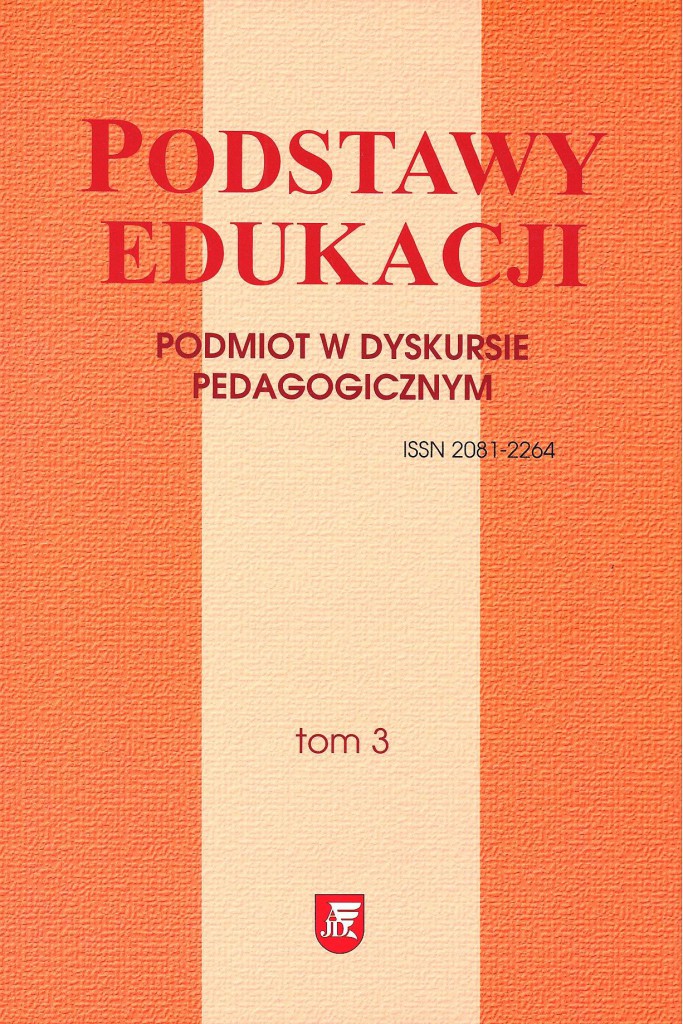Abstrakt
Tekst jest próbą rekonstrukcji koncepcji podmiotu według J. Kristevej. Przybliża jej fenomen, który polega na tym, że naukowo podporządkowane pisarstwo francuskiej autorki tworzy estetyczny wymiar psychanalizy w jej niuansach semiotycznych i symbolicznych. Wkrótce może się okazać, że ów wymiar jest niezbędny w pedagogicznym myśleniu i postępowaniu. Tym bardziej konieczna jest analiza prac M. Klein i S. Freuda, na którą wskazuje Kristeva, nam pedagogom zależy bowiem na dostępie do podmiotu, do jego życia psychicznego, by współdziałać w tworzeniu szans na zmiany w jego życiu i życiu społeczeństwa.
Bibliografia
Atwell-Wasey, W. (1998). Nourishing Words. Bridging Private Reading and Public Teaching. Albany.
Becker-Leckrone, M. (2005). Julia Kristeva and Literary Theory. New York.
Bollas, C. (1995). Cracking up: The Work of Unconscious Experience. New York.
Britzman, D.P. (1998). Lost Subjects, Contested Objects. Toward a Psychoanalytic Inquiry of Learning. Albany.
Britzman, D.P. (2003). After-Education Anna Freud, Melanie Klein, and Psychoanalytic Histories of Learning. Albany.
Cytowic, R.E. (2002). Synesthesia. A Union of the Senses. 2nd ed. Cambridge, Mass. – London.
Cytowic, R.E., Eagleman, D.M. (2009). Wednesday is Indigo Blue. Discovering the Brain of Synesthesia. London.
Davies, S., Higgins, K.M., Hopkins, R., Stecker, R., Cooper, D.E. (red.) (2009). A Companion to Aesthetic. 2nd ed. UK, USA.
Ellsworth, E.A. (1997). Teaching Positions. Difference, Pedagogy, and the Power of Address. New York and London.
Freud, S. (1997). Niesamowite [w:] S. Freud. Pisma psychologiczne. R. Reszke (tłum.). Warszawa.
Furth, H.G. (1981). Piaget and Knowledge. Theoretical Foundations. Chicago.
Ikegami T., Zlatev, J. (2007). From Pre-representational Cognition to Language. W: T. Zemke, J. Zlatev, R.M. Frank. Cognitive Linguistics Research Body, Language and Mind. Vol. 1, Embodiment. Berlin.
Kitliński, T. (1999). Polifonia Julii Kristevej, s. 2. http://dsw.muzeum.pl/magazynsztuki/archiwum/tekst (5.05.2009).
Kitliński, T. (2001). Obcy jest w nas. Kochać według Kristevej. Kraków.
Kristeva, J. (1980). From One Identity to an Other. W: J. Kristeva, Desire in Language. A Semiotic Approach to Literature and Art. New York.
Kristeva, J. (1984). Revolution in Poetic Language. M. Waller (tłum.). New York.
Kristeva, J. (1986). Women’s Time. W: T. Moi (red.). The Kristeva Reader. A. Jardine, H. Blade (tłum.). New York.
Kristeva, J. (1987a). In the Beginning Was Love: Psychoanalysis and Faith. A. Goldhammer (tłum.). New York.
Kristeva, J. (1987b). Stabat Mater. W: Tales of Love. L. Roudiez (tłum.). New York.
Kristeva, J. (1987c). Tales of Love. L. Roudiez (tłum.). New York.
Kristeva, J. (1998), Possessions. B. Bray (tłum.). New York.
Kristeva, J. (1995). New Maladies of the Soul. R.M. Guberman (red.). New York.
Kristeva, J. (1996). Cultural Strangeness and the Subject in Crisis. W: R.M. Guberman (red.). Julia Kristeva Interviews. New York.
Kristeva, J. (2000). The Sense and Non-Sense of Revolt: The Powers and Limits of Psychoanalysis. vol. 1. J. Herman (tłum.). New York.
Kristeva, J. (2002a). Intimate Revolt: The Powers and Limits of Psychoanalysis. vol. 2. J. Herman (tłum.). New York.
Kristeva, J., (2002b). Revolt, She Said. Cambridge.
Kristeva, J. (2007a). Czarne słońce. Depresja i melancholia. M.P. Markowski, R. Ryziński (tłum.). Kraków [wyd. ang. 1989].
Kristeva, J. (2007b). Potęga obrzydzenia. Esej o wstręcie. M. Falski (tłum.). Kraków.
McAfee, N. (2004). Julia Kristeva. New York.
Pollock, G. (red.) (1998). Julia Kristeva 1966–96: Aesthetics, Politics, Ethics. W: Parallax. Issue 8. July–September. London.
Rakowa, M. (2003). The Extended of the Literal, Metaphor, Polysemy an Theories of Concepts. New York.
Ramachandran, V.S., Hubbard, E.M. (2001). Synaesthesia – A Window Into Perception, Thought and Language. Journal of Consciousness Studies, 8, 12.
Raszkiewicz, H. (1999). Umysł w środowisku. Przegląd problematyki w kontekstach teorii reprezentacji umysłowych. Białystok.
Ricoeur, P. (2004). The Rule of Metaphor in Creation of Meaning in Language. R. Czerny (tłum.). New York.
Rogowska, A. (2007). Synestezja. Opole.
Sjöholm, C. (2005). Kristeva and the Political. London – New York.
Stone, L. (2002). „The Crisis of the Educated Subject: Insight from Kristeva for American Education”. Paper presented at the eight biennial conference of the International Network of Philosophers of Education, August, Oslo.
Stone, L. (2004). Julia Kristeva’s ‘Mystery’ of the Subject in Process. W: J.D. Marshall (red.). Poststructuralism, Philosophy, Pedagogy. New York, Boston, Dordrecht, London, Moscow.
OŚWIADCZENIE AUTORA:
Mam świadomość, że czasopismo jest wydawane na licencji Creative Commons - Uznanie autorstwa (https://creativecommons.org/licenses/by/4.0/legalcode).
Przesyłając artykuł wyrażam zgodę na jego udostępnienie na tej licencji.
